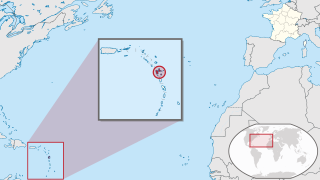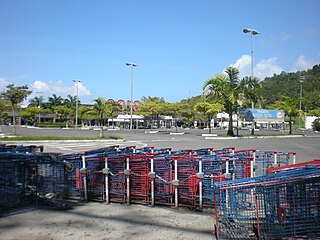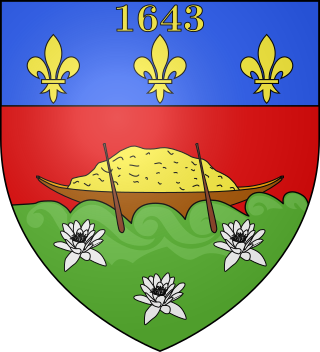
Guadeloupe is an archipelago and overseas department and region of France in the Caribbean. It consists of four inhabited islands—Basse-Terre, Grande-Terre, Marie-Galante, La Désirade, and the two inhabited Îles des Saintes—as well as many uninhabited islands and outcroppings. It is south of Antigua and Barbuda and Montserrat, north of the Commonwealth of Dominica. The region's capital city is Basse-Terre, located on the southern west coast of Basse-Terre Island; however, the most populous city is Les Abymes and the main centre of business is neighbouring Pointe-à-Pitre, both located on Grande-Terre Island. It had a population of 384,239 in 2019.

Martinique is an island and an overseas department/region and single territorial collectivity of France. An integral part of the French Republic, Martinique is located in the Lesser Antilles of the West Indies in the eastern Caribbean Sea. It has a land area of 1,128 km2 (436 sq mi) and a population of 364,508 inhabitants as of January 2019. One of the Windward Islands, it is directly north of Saint Lucia, northwest of Barbados and south of Dominica. Martinique is an Outermost Region and a special territory of the European Union; the currency in use is the euro. Virtually the entire population speaks both French and Martinican Creole.

France is divided into eighteen administrative regions, of which thirteen are located in metropolitan France, while the other five are overseas regions.
The overseas departments and regions of France are departments of France that are outside metropolitan France, the European part of France. They have exactly the same status as mainland France's regions and departments. The French Constitution provides that, in general, French laws and regulations apply to French overseas regions the same as in metropolitan France, but can be adapted as needed to suit the region's particular needs. Hence, the local administrations of French overseas regions cannot themselves pass new laws.

The administrative divisions of France are concerned with the institutional and territorial organization of French territory. These territories are located in many parts of the world. There are many administrative divisions, which may have political, electoral (districts), or administrative objectives. All the inhabited territories are represented in the National Assembly, Senate and Economic and Social Council and their citizens have French citizenship and elect the President of France.

An independence referendum was held in East Timor on 30 August 1999. The referendum's origins lay with the request made by the President of Indonesia, B. J. Habibie, to the United Nations Secretary-General Kofi Annan on 27 January 1999, for the United Nations to hold a referendum, whereby the Indonesian province would be given choice of either greater autonomy within Indonesia or independence.

An autonomy referendum was held in North Macedonia on 7 November 2004. Voters were asked whether they approved of overturning the municipal redistricting plans that gave greater autonomy to ethnic Albanians following the Ohrid Agreement that ended the 2001 conflict between ethnic Albanian militants and the predominantly ethnic Macedonian government forces. These had been changed to give ethnic Albanians greater control in districts where they had significant presence and gives local authorities greater control over education, health and development. It also reduced the number of municipalities from 123 to 84.
Events from the year 1946 in France.

The 2009 French Caribbean general strikes began in the French overseas region of Guadeloupe on 20 January 2009, and spread to neighbouring Martinique on 5 February 2009. Both islands are located in the Lesser Antilles of the Caribbean. The general strikes began over the cost of living, the prices of basic commodities, including fuel and food, and demands for an increase in the monthly salaries of low income workers.

A referendum on becoming an autonomous overseas territory was held in French Guiana on 10 January 2010. The proposal was rejected by 70% of voters who prefer full integration in the French central state. The turnout was 48%. A simultaneous referendum was rejected in Martinique.
A referendum on becoming an overseas territory was held in Martinique on 10 January 2010. The proposal was rejected by 79% of voters, with a turnout of 55%. A simultaneous referendum was rejected in French Guiana.
The Collectivity of Saint Martin was a French commune for many years and formed part of Guadeloupe, which is an overseas région and département of France and is therefore in the European Union. In 2003, the population of the French part of the island voted in favour of secession from Guadeloupe in order to form a separate overseas collectivity (COM) of France. On 9 February 2007, the French Parliament passed a bill granting COM status to both the French part of Saint Martin and neighbouring Saint Barthélemy. The new status took effect once the local assembly was elected on 15 February 2007. Saint Martin remains part of the European Union.

An independence referendum was held in the Comoros on 22 December 1974. The overall result was a strong "yes" vote, with 94.57% of voters voting for independence and almost all the "no" votes being cast in Mayotte, where there was a majority for remaining under French control. In contrast, on Mohéli only five out of 6,059 votes were against independence. Voter turnout was 93.3%.

Overseas France consists of 13 French-administered territories outside Europe, mostly the remains of the French colonial empire that chose to remain a part of the French state under various statuses after decolonization. They are part of the European Union. This collective name is used in everyday life in France but is not an administrative designation in its own right. Instead, the five overseas regions have exactly the same administrative status as the metropolitan regions; the five overseas collectivities are semi-autonomous; and New Caledonia is an autonomous territory. Overseas France includes island territories in the Atlantic, Pacific and Indian Oceans, French Guiana on the South American continent, and several peri-Antarctic islands as well as a claim in Antarctica. Excluding the district of Adélie Land, where French sovereignty is effective de jure by French law, but where the French exclusive claim on this part of Antarctica is frozen by the Antarctic Treaty, overseas France covers a land area of 120,396 km2 (46,485 sq mi) and accounts for 18.0% of the French Republic's land territory. Its exclusive economic zone (EEZ) of 9,825,538 km2 (3,793,661 sq mi) accounts for 96.7% of the EEZ of the French Republic.

Guadeloupe Women's National Football Team is the national team of Guadeloupe. They have only played in very few matches.
A referendum on autonomy was held in Guadeloupe on 7 December 2003. Voters were asked whether they wanted the island to become a territorial collectivity, which would have given the regional government more autonomy. The proposal was rejected by 73% of voters.
Prostitution in Overseas France varies from area to area with regard to extent, law enforcement and legality.
The 2021–2022 French West Indies unrest is a social conflict that has been taking place since November 17, 2021 in the French West Indies, particularly in Guadeloupe and Martinique. Unrest has also been reported in other Overseas Territories like Saint Pierre and Miquelon.











